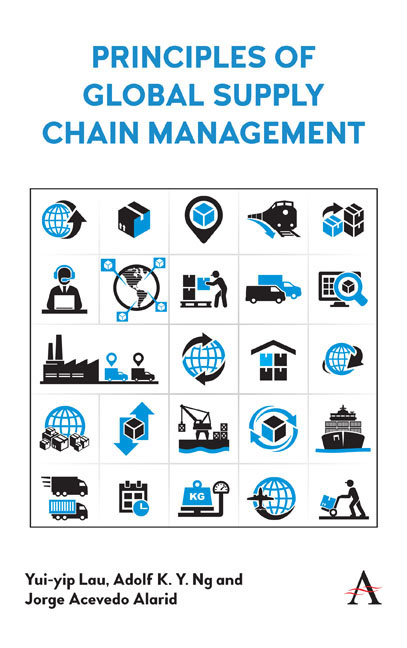Book contents
- Frontmatter
- Contents
- List of Figures
- List of Tables
- Foreword
- Preface
- About the Authors
- 1 Introduction
- 2 Managing Outbound Logistics and Distribution
- 3 Supplier Selection and Procurement
- 4 Warehouse Management
- 5 Case Studies in Food Supply Chains
- 6 Inland Ports in Global Supply Chains
- 7 Climate Change in a Global Environment
- 8 Sustainability in Infrastructure-Based Supply Chains
- 9 Reverse Logistics
- 10 Logistics Associations
- 11 Logistics Education
- 12 Case Exercises in Global Supply Chains
- Appendix
- Index
11 - Logistics Education
- Frontmatter
- Contents
- List of Figures
- List of Tables
- Foreword
- Preface
- About the Authors
- 1 Introduction
- 2 Managing Outbound Logistics and Distribution
- 3 Supplier Selection and Procurement
- 4 Warehouse Management
- 5 Case Studies in Food Supply Chains
- 6 Inland Ports in Global Supply Chains
- 7 Climate Change in a Global Environment
- 8 Sustainability in Infrastructure-Based Supply Chains
- 9 Reverse Logistics
- 10 Logistics Associations
- 11 Logistics Education
- 12 Case Exercises in Global Supply Chains
- Appendix
- Index
Summary
Education generates human capital and competitive advantages of nations, including the logistics and supply chain sectors. In order to meet everchanging logistics business environment, the logistics education in Hong Kong has undergone significant changes in the postmodern era. In this chapter, we will achieve the following objectives:
• provide an overview of Hong Kong's logistics education;
• evaluate the impact of the 334- education reform on the development of Hong Kong's logistics education; and
• summarize the restructuring of logistics education in Hong Kong.
Introduction
Logistics industry is traditionally one of the four economic pillars of Hong Kong (The Census and Statistics Department, 2016). Within service, the logistics industry has generated 6 percent of Hong Kong's total GDP in 2015. Thanks to the domestic demand and investments, Hong Kong's annual growth rate (in terms of GDP) has recorded an average of 5.38 percent between 1974 and 2015 (The Census and Statistics Department, 2016). Recently, Hong Kong has become an international hub for trade, business and finance, notably, with Mainland China entering the World Trade Organization (WTO) in 2001, the introduction of Mainland and Hong Kong Closer Economic Partnership Arrangement (CEPA) in 2003 and the introduction of the “Belt and Road” initiative in 2015. As such, the logistics industry has made significant economic contributions to the ever- changing global environment. However, Hong Kong's logistics industry has faced keen competition with neighboring countries in the Asia- Pacific regions. To further strengthen and consolidate the competitiveness of Hong Kong's logistics industry in the world, it would be crucial to develop a comprehensive logistics education. In today's global and dynamic environment, there has been increasing concern that professional education could be an effective approach to improve productivity, and employees of the highest quality have the quality and competency to respond effectively to continuous changes (Becker, 1993). Recently, there has been a tremendous growth in academic institutions considering apprentice- style, non academic learning approaches to add on their “professional” and “practicebased” programs (Bourner et al., 2001).
- Type
- Chapter
- Information
- Principles of Global Supply Chain Management , pp. 163 - 176Publisher: Anthem PressPrint publication year: 2019



